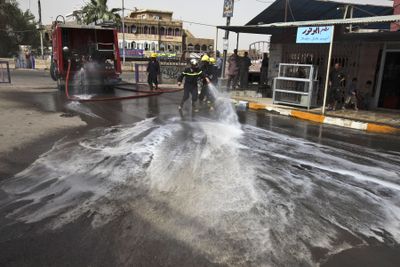Three U.S. soldiers killed in Iraq
Roadside bombing latest in 24-hour spate of violence

BAGHDAD – Three American soldiers on foot patrol were among 25 people killed in Iraq on Thursday in an upsurge of violence that brought to 60 the number killed over a 24-hour period, the U.S. military and Iraqi police said.
The Americans were killed in the southern Baghdad neighborhood of Dora by an improvised explosive device that detonated near their patrol, the military said in a statement. According to Iraqi police, five U.S. soldiers also were wounded.
Twelve Iraqis were reported killed in the blast, which occurred in a busy shopping street in a once mostly Christian area known as the Assyrian market, police said.
Dora is a former Sunni insurgent stronghold that has been largely pacified with the help of the Awakening Councils, made up of Sunnis who switched sides and joined with U.S. forces to fight the insurgency.
In the northern city of Kirkuk, eight Awakening members were killed Thursday by a suicide bomber who detonated his explosives as they lined up at an Iraqi army base to collect their paychecks. Kirkuk has been flashpoint for conflicts between sectarian groups competing for control of the oil-rich area.
In a third attack, two Iraqi policemen were killed and five injured when a bomb exploded at their police station in the western Baghdad neighborhood of Yarmouk.
Thursday’s attacks came a day after a car bomb exploded at a busy market in the Shuala district of northwestern Baghdad, killing 35 people and shattering a relative lull in the capital over the past three weeks. April saw a spate of high-profile bombings that caused hundreds of civilian casualties, but May had been quieter.
The U.S. military says the insurgency no longer has the capacity to sustain prolonged bombing campaigns and instead focuses on producing spikes in the violence that grab attention by causing large numbers of casualties.
“I think al-Qaida is on a sort of cyclical operation in terms of its attacks, and we happen in this week to be in one of their attack cycles,” said Lt. Col. John Vermeesch, who commands U.S. forces in northwestern Baghdad.
However, there are widespread fears that violence will rise as the insurgency seeks to assert its presence ahead of the scheduled withdrawal of U.S. forces from Iraq’s cities, including Baghdad.
Under the terms of an accord reached last year between American and Iraqi officials, U.S. troops are supposed to be out of urban areas by June 30.